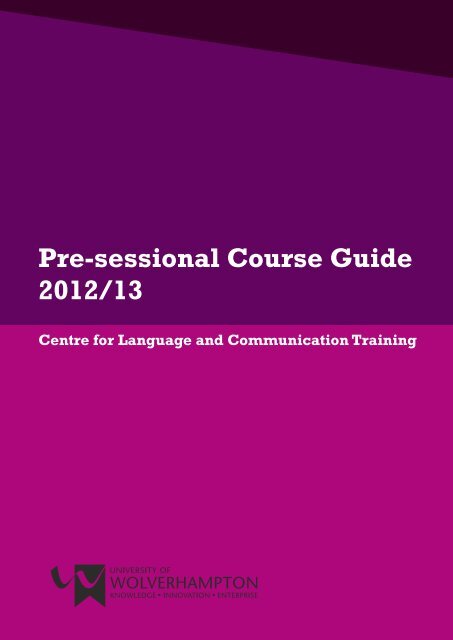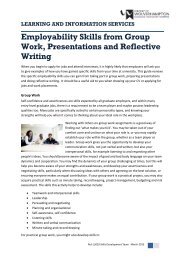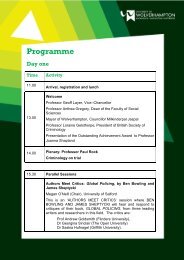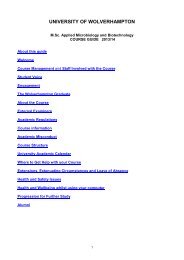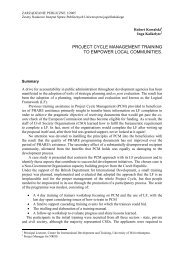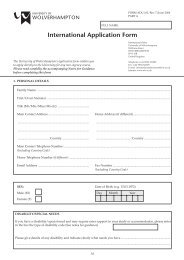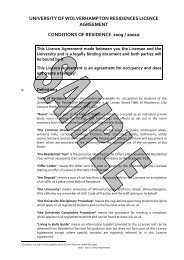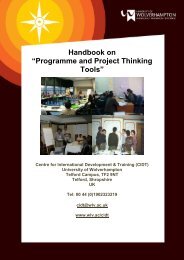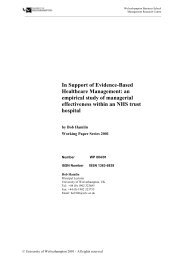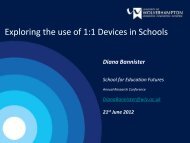Pre-sessional Course Guide - University of Wolverhampton
Pre-sessional Course Guide - University of Wolverhampton
Pre-sessional Course Guide - University of Wolverhampton
- No tags were found...
You also want an ePaper? Increase the reach of your titles
YUMPU automatically turns print PDFs into web optimized ePapers that Google loves.
Welcome to the <strong>Pre</strong>-<strong>sessional</strong> course at the<strong>University</strong> <strong>of</strong> <strong>Wolverhampton</strong>!The <strong>Pre</strong>-<strong>sessional</strong> course requires hard work anddedication to pass, and we hope you enjoy yourcourse and leave us feeling prepared for yourdegree study. We expect you to be motivated andshow commitment to improvement during thecourse. Your teachers will do everything they canto help you achieve your aims, encourage you towork hard and give feedback regularly about howyou are doing. Good luck!Daphne LaingDirector, Centre for Language and Communication Training
<strong>Course</strong> Aims and ObjectivesYou will be marked on your ability to:• Comprehend the gist from a range <strong>of</strong> complextexts e.g. news items, interviews, lectures,academic articles, talks and presentations.• Contribute effectively via discussion, forums,seminars and presentations on a range <strong>of</strong>technical issues with a degree <strong>of</strong> fluency andspontaneity and authentic interaction.• Produce cogent, complex tasks on a widerange <strong>of</strong> topics to include reports, arguments,and data analysis.(The above are based on CEFR B2 descriptors)
<strong>Course</strong> contentDuring your <strong>Pre</strong>-<strong>sessional</strong> course you will:• Improve and develop your English in smallcommunicative classes which take an integratedskills approach.• Learn about study at the <strong>University</strong>.• Have regular one-to-one tutorials with our<strong>University</strong> lecturers to check on your progressand set targets.• Discuss and exchange ideas informally withother <strong>University</strong> <strong>Pre</strong><strong>sessional</strong> students across theglobe via social networking forums.• Hear and read lectures given by academicstaff from the <strong>University</strong>• Study a topic in detail using authentic academictexts and listening material and undertakingoriginal research.
Skills workThe classes will include work on the following:Listening:• Understand the main points and structure and extract keydetails from a range <strong>of</strong> listening media• Develop vocabulary learning strategies to learn specialisedvocabulary from extended listening material• Understand the tutors and each other when speaking English• Take appropriate and comprehensible notes• Become familiar with different varieties <strong>of</strong> spoken Englishand verbal and non-verbal cuesWriting:• Making notes while someone is talking, both face to face andfrom recorded material• Expressing opinions and giving reasons• Writing a basic report <strong>of</strong> a factual nature and begin to evaluate,advise etc.• Making and using simple, clear notes for essay andrevision purposes• <strong>Pre</strong>senting arguments in writing using appropriate vocabulary,grammar and register• Control <strong>of</strong> organisational patterns and using cohesive devicesappropriatelyReading:• Using appropriate strategies to obtain information from texts• Understanding the general meaning <strong>of</strong> authentic writtenmaterial and be able to extract specific information• Summarising in your own words the main points <strong>of</strong> anarticle
• Developing ways <strong>of</strong> learning specialist vocabulary• Distinguishing between written fact and opinionSpeaking:• Speak at length in academic contextso <strong>Pre</strong>sentationo Seminaro Discussion and debate• Contribute appropriately and confidently in an academiccontext both formally and informally• Can make your self understood in a range <strong>of</strong> speakingcontexts without causing strain for the listener• <strong>Pre</strong>sent data in a clear and concise style
AssessmentYour course will be assessed via continuous assessment. Classactivities and tasks in class will be marked and returned to you forredrafting and correction. You will need to demonstrate consistenteffort and progress throughout the course. This means that in orderto progress to your degree programme you must:1. Comprehend the gist from a range <strong>of</strong> complex texts e.g. newsitems, interviews, lectures, academic articles, talksand presentations.2. Contribute effectively via discussion, forums, seminars andpresentations on a range <strong>of</strong> technical issues with a degree <strong>of</strong>fluency and spontaneity and authentic interaction.3. Produce cogent, complex tasks on a wide range <strong>of</strong> topics toinclude reports, arguments, and data analysis.4. Attend 80% <strong>of</strong> classes.5. Produce a portfolio <strong>of</strong> writing tasks(Descriptive; Narrative; Explanatory; A critical analysis).6. Give a presentation.7. <strong>Pre</strong>pare for and contribute to a class seminar or debate.8. Complete independent learning activities ( homework) asRequired.
SyllabusYour course will be based around key texts and key listening materialswhich will enable you to study a topic in depth and develop your reading,listening and research skills. The details below may be added to orchanged based on the needs <strong>of</strong> the students in each group.Intermediate 1Reading and Vocabulary: Spelling, Vocabulary, reading strategiesWriting and Grammar Sentence structure, narrative tenses, comparativesand superlatives, reported speech, structure <strong>of</strong> essaysSpeaking and Listening Forming questions, pronunciation, focus onfluency and clarityIntermediate 2Grammar: Understanding and using verb tenses, prepositions, usingmodals and adjectives to express difference, linking devices, language todescribe graphs and diagramsReading: Survey, skimming, scanning and using background knowledge,reading for specific information, introduction to critical skillsWriting: Organising your ideas in a sentence, organising your ideas in aparagraph, linking your ideas, writing a summary and paraphrasingSpeaking: Introduction to pronunciation, informal conversation skills,formal English style, the language <strong>of</strong> presentations.Listening: Listening for general understanding, taking notes, identifyingthe main ideas, listening for specific information
AdvancedGrammar: Understanding and using modals, using the passive and otherdevices in academic writingReading: Review comprehension skills, identifying supporting evidencefrom a text. Consolidation <strong>of</strong> critical skillsWriting: Structuring an essay, drafting, error correction and editing, pro<strong>of</strong>readingSpeaking: Language for seminars, discussion and debateListening: Understanding and responding to content in a range <strong>of</strong>academic contexts (lectures, seminars, debates, etc.)
Intermediate 1Assessment tasksWriting PortfolioCompletion <strong>of</strong> three writing tasks which include the following:· Writing about a short unexpected journey or holiday using a variety<strong>of</strong> tenses· Comparing and contrasting two cities· Writing a report which includes a questionnaire. Students canchoose the topic.A mini-presentationStudents will present a short talk <strong>of</strong> approximately 5 minutes on a topic <strong>of</strong>their choice. Students MUST NOT read from a script.Spelling and Vocabulary AssessmentThis is an in-class test based on a range <strong>of</strong> academic vocabulary that arisesin the course.Deadlines:Writing task 1 at the end <strong>of</strong> week 2Writing task 2 at the end <strong>of</strong> week 3Writing task 3 at the end <strong>of</strong> week 4.During your weekly tutorial you will be given feedback on your task, sothat you can improve your writing before you finally submit the task.
Intermediate 2Assessment tasksWriting TasksThis involves completion <strong>of</strong> the following:1. A Summary. This will involve summarising parts <strong>of</strong> one <strong>of</strong> thereading texts.2. Writing an analysis <strong>of</strong> a graph or diagram from the article “LivingArrangements”These tasks will help with writing the essay in the next course. They willalso be referred to for borderline grades on the critical essay.A <strong>Pre</strong>sentationA group presentation which follows academic conventions. It will be 15 to20 minutes in length and the topic will be related to one <strong>of</strong> the reading orlistening texts. A pass grade is required and will be included in the overallgrades at the end <strong>of</strong> the Advanced course.Deadlines:Writing task 1 First draft: Week 2 <strong>of</strong> the courseWriting task 2 First draft: Week 3 <strong>of</strong> the course.Final submission <strong>of</strong> tasks: Week 4 <strong>of</strong> the course.<strong>Pre</strong>sentation: Week 4.
AdvancedAssessment tasksA critical analysis 500 wordsYou will use your research skills to find information on a topic <strong>of</strong> yourchoice. You will write two drafts. After the first draft your teacher will giveyou feedback to help you improve your writing for the final draft. Youmust include the following:· In-text citation· A reference listSeminarYou will take part in a discussion on a topic related to one <strong>of</strong> the readingor listening resources. The topic will be decided in class during week 2.You will individually research the topic and take notes on one side <strong>of</strong> A4,which you will bring to the class discussion. It is important to interactspontaneously during the seminar and not rely on pre-prepared“speeches”.Listening AssessmentNote-taking and summary task based on a listening text in an academiccontext.Deadlines:Critical Essay:First draft at the end <strong>of</strong> week 2 <strong>of</strong> the Advanced courseFinal version at the end <strong>of</strong> week 4 <strong>of</strong> the Advanced courseSeminar: at the end <strong>of</strong> week 4 <strong>of</strong> the Advanced courseListening Assessment: at the end <strong>of</strong> week 4 <strong>of</strong> the Advanced course
Assessment criteriaWriting tasksDistinction: Excellent task which demonstrates considerable progress, sustained effortand commitment. A high level <strong>of</strong> competence is achieved in the organisation <strong>of</strong> thewriting. Ideas are logically ordered and linking is highly effective. Excellent use <strong>of</strong>appropriate register, and a very good level <strong>of</strong> grammatical accuracy is developed.Where appropriate, correct reference list and in-text citations are provided.Merit: Good work which demonstrates steady progress and generally a sustainedeffort and commitment. Quite a good level <strong>of</strong> competence is achieved in theorganisation <strong>of</strong> the writing. Ideas are generally logically ordered and linkedappropriately. An awareness <strong>of</strong> appropriate register is demonstrated and quite a goodlevel <strong>of</strong> grammatical accuracy is developed. Errors will be evident although they willnot impede understanding. Where appropriate, the reference list and in-text citationare present and generally correct.Pass: Satisfactory work which demonstrates some progress. Effort and commitmentare evident but not always consistent throughout the assignment. A satisfactory level<strong>of</strong> competence is achieved in the organisation and linking <strong>of</strong> ideas although points maynot always be clearly ordered and linking may not always be successful. Appropriateregister will be attempted but not sustained. A satisfactory level <strong>of</strong> grammaticalaccuracy will be developed throughout the portfolio although there will be manyerrors which could cause some strain for the reader. However, the overall meaning isnot impeded. There is an awareness <strong>of</strong> referencing although it may not be correctlypresented.Fail: Work not completed. No evidence <strong>of</strong> sufficient progress and there is littleevidence <strong>of</strong> commitment or effort. Organisation is very poor. Ideas are not clearlyordered and linking is absent or ineffective. Register is inappropriate, and grammaticalaccuracy is very poor causing severe strain for the reader. Ideas are either notattributed or copied from sources.SeminarDistinction: The topic was very well researched and prepared; excellent groupinteraction and excellent use <strong>of</strong> seminar language. A high level <strong>of</strong> accuracy in grammarand pronunciation. Very good understanding and responses in context.
Merit: Research into the topic was above average. Good group interaction and veryeffective use <strong>of</strong> seminar language. Very good pronunciation, grammar and vocabulary.Good understanding and response in context.Pass: The research is satisfactory. Group interaction is quite good and some seminarlanguage is included in the discussion. Errors in pronunciation and grammar do occurbut do not impede understanding. Some understanding and responses in context.Fail: Inadequate research and or use <strong>of</strong> seminar language. Very poor group interaction.Very poor grammar and pronunciation prevents understanding. A very limitedunderstanding and response to the topic.<strong>Pre</strong>sentationDistinction: The presentation was very well researched, prepared and rehearsed; excellentcohesion between team members; excellent subject choice; excellent control<strong>of</strong> grammar and use <strong>of</strong> language <strong>of</strong> presentations; pronunciation excellent; visualswere impressive and added to the presentation; excellent audience contact; clear; perfectlytimed; well structured and sequenced. Some insight into the subject was demonstrated.Merit: Well researched, rehearsed and prepared; teamwork; very good subject choicewhich was mostly clearly presented with appropriate linking, visual support; good languagecontrol and use <strong>of</strong> language <strong>of</strong> presentations; very good pronunciation. Knowledge<strong>of</strong> the subject was demonstrated.Pass: Well prepared material; you presented the material as a team; on the whole anappropriate subject choice; grammar, pronunciation and/or visuals caused some problemsfor the audience, but the meaning on the whole was clear; knowledge <strong>of</strong> thesubject was clear although errors in word choice, grammar or pronunciation causedsome misunderstanding on minor issues.Fail: Inadequate and / or inappropriate subject choice; the audience would not havebeen able to understand the presentation. Reading entirely from a script. Very poorteam cohesion.


